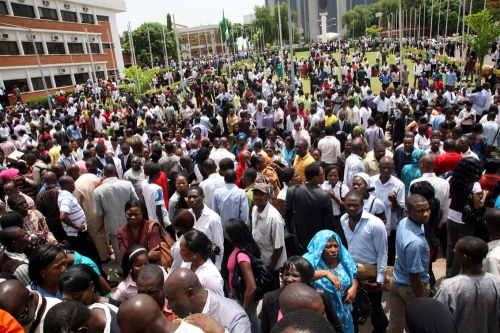Business
“Growth Alone Unlikely To End Extreme Poverty” World Bank Says Nigeria Has Largest Number Of Poor

At the ongoing IMF/World Bank Spring , the World Bank President, Jim Yong Kim, stated that Nigeria is one of the top five countries that has the largest number of poor.
According to him, Nigeria ranked third in the world while India ranked number one with 33 per cent of the world poor. China is ranked second with 13 per cent of the world’s poor, followed by Nigeria where seven per cent of the world poor live in.
He said “while economic growth remains vital for reducing poverty, growth has its limits, according to a new World Bank paper released today. Countries need to complement efforts to enhance growth with policies that allocate more resources to the extreme poor. These resources can be distributed through the growth process itself, by promoting more inclusive growth, or through government programs, such as conditional and direct cash transfers.
In the area of direct cash transfers, here’s what the world bank President had to say
“It is imperative not just to lift people out of extreme poverty; it is also important to make sure that, in the long run, they do not get stuck just above the extreme poverty line due to a lack of opportunities that might impede progress toward better livelihoods. Economic growth has been vital for reducing extreme poverty and improving the lives of many poor people. Yet, even if all countries grow at the same rates as over the past 20 years, and if the income distribution remains unchanged, world poverty will only fall by 10 percent by 2030, from 17.7 percent in 2010. This is simply not enough, and we need a laser like focus on making growth more inclusive and targeting more programmes to assist the poor directly if we’re going to end extreme poverty.”
Kim added: “To end extreme poverty, the vast numbers of the poorest – those earning less than $1.25 a day – will have to decrease by 50 million people each year until 2030. This means that one million people each week will have to lift themselves out of poverty for the next 16 years. This will be extraordinarily difficult, but I believe we can do it. This can be the generation that ends extreme poverty.
“Growth alone is unlikely to end extreme poverty by 2030 because as extreme poverty declines, growth on its own tends to lift fewer people out of poverty. This is because, by this stage, many of the people still in extreme poverty live in situations where improving their lives is extremely difficult. Even if there is no change in inequality, the “poverty-reducing power” of economic growth is less in countries that are initially more unequal.”






